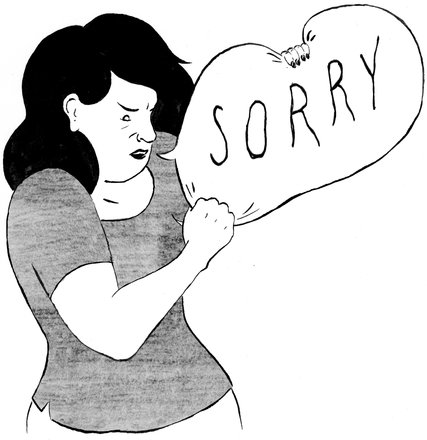I clearly remember running full speed down the field with my stick in my hand, kilt flapping in the wind and a marked determination on my face. I was going to check that chick and get the ball back. I set my mark, checked and got the ball; the tides turned and she took the offensive. Slashing like an amateur, she walked my thumb so hard against my lacrosse stick it broke. We stopped playing, my thumb hung off my hand like a fingerless glove. My opponent was crying. I was in shock and didn’t feel a thing, so I was laughing. She was practically yelling, “Oh my god, I’m so so sorry. I’m so sorry.”
While she was right for apologizing, it was almost such commonplace to say sorry that it didn’t really mean much. We all spent tons of time saying sorry for simply playing the game. Someone would fall over and we’d apologize. Someone would get pushed and we’d say sorry. It was insane.
I had a teacher at an all-girls middle school who got so sick of us apologizing and so annoyed that we couldn’t take a compliment that she made us sit in a circle and pass around a card she’d laminated. In huge letters it read: THE COMPLIMENT CARD. When you held the compliment card, you were charged with giving praise to a classmate. That wasn’t the hard part. When someone complimented you, the mandatory response was: “Thank you.” It was impossible for some girls. Tears flowed, excuses oozed out, we squirmed and nervously awaited our turn to be complimented. We did this every morning before class. Her point: when someone pays you a compliment don’t brush it off with dismissals, simply say ‘thank you.’ I’ve kept this lesson close to my heart since 6th grade.
When this story came out of the NY Times, I was reminded of Mrs. Johnson’s six grade lesson and how it’s just as important today as it was then. Enjoy
EVERYONE knows what dirt tastes like. Last week, I ordered a salad at a restaurant and found myself crunching on a shoddily washed leaf. I took a few more sandy bites before explaining the situation to my waiter, apologizing and asking to see the menu once again.
When my second-choice dish arrived, 20 minutes later, it was blanketed in bacon. I don’t eat meat, a dietary restriction for which I was “very sorry.” By the time a plate of edible food appeared, my fork had been a casualty of the confusion. Unable to catch the waiter’s eye, I walked to the kitchen, where I apologized to a busboy.
For so many women, myself included, apologies are inexorably linked with our conception of politeness. Somehow, as we grew into adults, “sorry” became an entry point to basic affirmative sentences.
True, this affliction is not exclusive to our gender. It can be found among men — in particular, British men — but it is far more stereotypical of women. So, in the words of a popular 2014 Pantene ad, why are women always apologizing?
One commonly posited theory, which informs everything from shampoo commercials to doctoral dissertations, is that being perceived as rude is so abhorrent to women that we need to make ourselves less obtrusive before we speak up. According to a 2010 study in the journal Psychological Science, “women have a lower threshold for what constitutes offensive behavior,” so are more likely to see a need for an apology in everyday situations. We are even apt to shoehorn apologies into instances where being direct is vital — such as when demanding a raise.
I’m dubious about this catchall explanation. The bend-over-backward compulsion to avoid giving offense might account for plenty of unnecessary “pleases” or “excuse me’s,” but it doesn’t sufficiently account for the intensity of a “sorry.”
Here’s the paradox: Every day, we see more unapologetically self-assured female role models, yet women’s extreme prostration seems only to have increased. A recent “Inside Amy Schumer” sketch wonderfully skewered our propensity to apologize: One by one, various accomplished women on a panel apologize, first for trivial things like being allergic to caffeine, or for talking over one another, but finally for having the gall to exist in the first place. The discrepancy between what those women offer the world and how they conduct themselves in it elevates the sketch from amusing to disturbing.
This is not to suggest that all men are rude and unapologetic and that women are the inverse, but something incongruous is happening in women’s behavior that can’t be chalked up to reflexive politeness. Look at the Metropolitan Transportation Authority’s new ads warning New York straphangers against inconsiderate behavior, like eating on the subway or manspreading. Graphics depict men displaying almost all these behaviors, except, perhaps in an effort to provide gender balance, the one that advises women to avoid elbows-out personal grooming.
The scenario seems ridiculously unrealistic — and not just because it’s the only one I’ve never witnessed firsthand. The ads are saying that men are far less likely to be conscious of personal space than women. So why, even after making ourselves physically smaller on the subway, are we still the ones apologizing?
I think it’s because we haven’t addressed the deeper meaning of these “sorrys.” To me, they sound like tiny acts of revolt, expressions of frustration or anger at having to ask for what should be automatic. They are employed when a situation is so clearly not our fault that we think the apology will serve as a prompt for the person who should be apologizing.
It’s a Trojan horse for genuine annoyance, a tactic left over from centuries of having to couch basic demands in palatable packages in order to get what we want. All that exhausting maneuvering is the etiquette equivalent of a vestigial tail.
When a woman opens her window at 3 a.m. on a weeknight and shouts to her neighbor, “I’m sorry, but can you turn the music down?” the “sorry” is not an attempt at unobtrusiveness. It’s not even good manners. It’s a poor translation for a string of expletives.
These sorrys are actually assertive. Unfortunately, for both addresser and addressee alike, the “assertive apology” is too indirect, obscuring the point. It comes off as passive-aggressive — the easiest of the aggressions to dismiss.
So we should stop. It’s not what we’re saying that’s the problem, it’s what we’re not saying. The sorrys are taking up airtime that should be used for making logical, declarative statements, expressing opinions and relaying accurate impressions of what we want.
We are not sorry to ask for an email that should have been sent to us weeks ago, or to expect to receive the item we paid for, or to be bumped into on the subway. Yes, we should take the shampoo commercial’s advice and weed out the word when it’s superfluous. But it’s just as important to articulate exactly what we mean in its place.
Julia Child, a consummate charmer, said it best: “Never apologize.” Probably because she never asked anyone to eat dirt.





